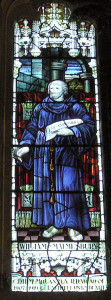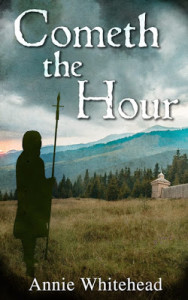 Relevant History welcomes back Annie Whitehead: an author, a historian, and a member of the Royal Historical Society. Her first two novels are set in tenth-century Mercia, chronicling the lives of Æthelflæd, Lady of the Mercians, who ruled a country in all but name, and Earl Alvar, who served King Edgar and his son Æthelred the Unready who were both embroiled in murderous scandals. Her third novel, Cometh the Hour, also set in Mercia, tells the story of seventh-century King Penda and his feud with the Northumbrian kings. She is currently working on a history of Mercia for Amberley Publishing, to be released in 2018. For more information about her and her books, visit her web site and blog, and follow her on Facebook and Twitter.
Relevant History welcomes back Annie Whitehead: an author, a historian, and a member of the Royal Historical Society. Her first two novels are set in tenth-century Mercia, chronicling the lives of Æthelflæd, Lady of the Mercians, who ruled a country in all but name, and Earl Alvar, who served King Edgar and his son Æthelred the Unready who were both embroiled in murderous scandals. Her third novel, Cometh the Hour, also set in Mercia, tells the story of seventh-century King Penda and his feud with the Northumbrian kings. She is currently working on a history of Mercia for Amberley Publishing, to be released in 2018. For more information about her and her books, visit her web site and blog, and follow her on Facebook and Twitter.
*****
Research for my history of the ancient kingdom of Mercia has seen me studying various primary and secondary sources covering a period of four and a half centuries, ending with 1066 and beginning with the pre-Christian seventh century. Sometimes, I’ve only had one written record from which to glean evidence; these people lived long ago, and far away, in a place we wouldn’t recognise.
Imagine then, my delight, when I read what at first glance seems a rather turgid tome: William of Malmesbury’s Deeds of the Bishops of England.
It’s true that back then, people thought, spoke, and prayed differently. But among the tales of saintly bishops, and miraculous goings-on, I found some nuggets which prove the adage plus ca change, plus c’est la même chose (the more things change, the more they stay the same).
 William of Malmesbury was born around 1095, of an English mother and a Norman father. He is probably best remembered for his Deeds of the Bishops and the Deeds of the Kings of England, and one does not have to be a scholar to guess the nature of these books.
William of Malmesbury was born around 1095, of an English mother and a Norman father. He is probably best remembered for his Deeds of the Bishops and the Deeds of the Kings of England, and one does not have to be a scholar to guess the nature of these books.
And yet…This is how William ends his Deeds of the Bishops: ‘It has also been a black year for weather. Every month has had thunder and lightning. It has rained almost every day without stopping. Even the summer months were wet and muddy.’ Now, maybe you’re reading this in the USA, but let me tell you, walk down any street in England today, or any day, winter or summer, and you’ll hear someone saying almost exactly the same thing.
Elsewhere, when William writes of the bishops in Northumbria, he says: ‘The whole speech of the Northumbrians, especially that of the men of York, grates so harshly upon the ear that it is completely unintelligible to us southerners. The reason for this is their proximity to barbaric tribes and their distance from the kings of the land who, whether English as once or Norman as now, are known to stay more often in the south than the north.’ Again, speak to anyone in England and they will have an opinion on the north/south divide. Southerners complain about uncouth northerners, while northerners bewail the London-centric government and clamour for their own high-speed rail links and ‘Northern Powerhouse’.
In 1005, Bishop Ælfheah of Winchester was famously, brutally, murdered by the forces of King Cnut. Some sources say he was stoned to death, some that he was pelted with ox bones. William writes about Ælfheah at length, describing how the good bishop drove away a plague, and by God’s grace was able to put out, with the sign of a cross, a raging inferno which was threatening to destroy a village. Fanciful? A little, perhaps, to our cynical, twenty-first-century minds.
But William also tells us that one night, Bishop Ælfheah saw a drunk monk being battered by demons sent by God to punish him. ‘After Ælfheah told the others about this in the morning, it is not surprising that his drinking companions turned teetotal.’ Who among us doesn’t have a story about someone—maybe ourselves—swearing off the drink after a heavy night, with the words, ‘Never again’?
Miracles, saintly acts, devotional prayers. A different language, sensibilities, culture and set of beliefs, and a ‘lack’ of technology. All these things are to be expected when we begin to examine the past.
William’s little asides remind us that in some respects, human nature does not change. And it is useful to remember, as we go about our studies, that these are not simply names from a bygone age, but that they were real people, with real lives.
*****
 A big thanks to Annie Whitehead. She’ll give away a paperback copy of Cometh the Hour to someone who contributes a comment on my blog this week. I’ll choose the winner from among those who comment by Friday at 6 p.m. ET. Delivery is available worldwide.
A big thanks to Annie Whitehead. She’ll give away a paperback copy of Cometh the Hour to someone who contributes a comment on my blog this week. I’ll choose the winner from among those who comment by Friday at 6 p.m. ET. Delivery is available worldwide.
**********
Did you like what you read? Learn about downloads, discounts, and special offers from Relevant History authors and Suzanne Adair. Subscribe to Suzanne’s free newsletter.
